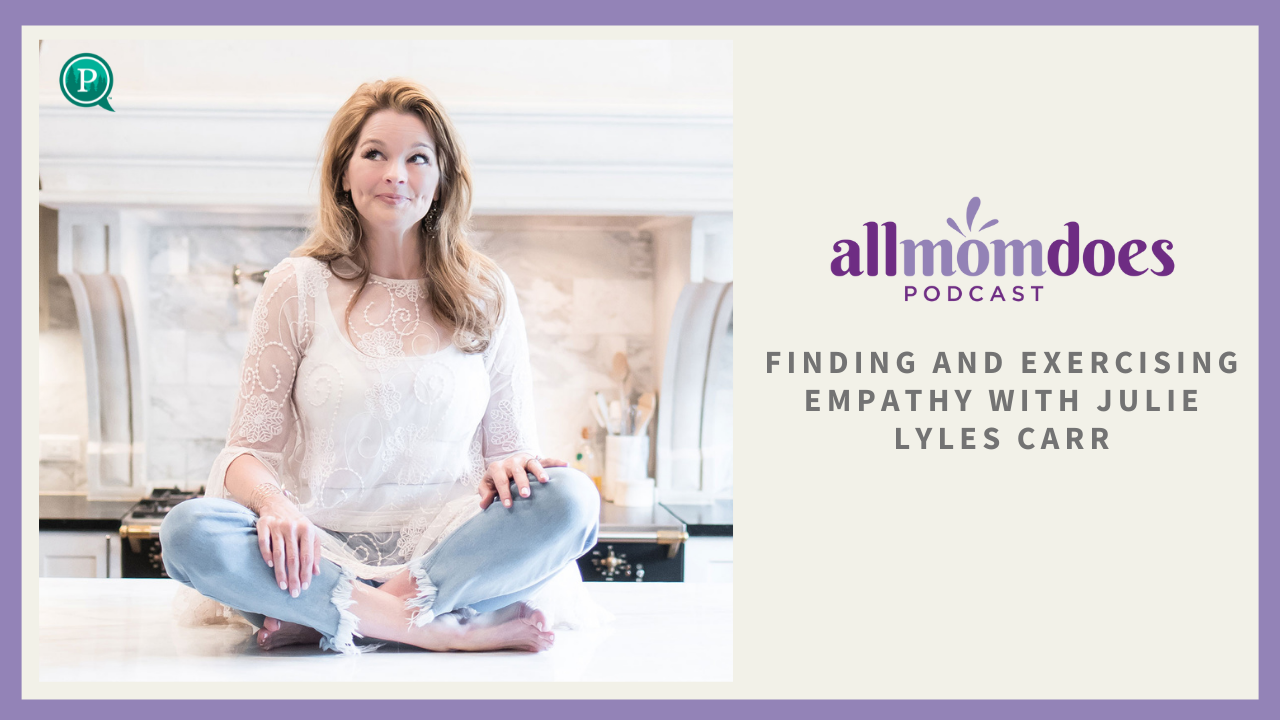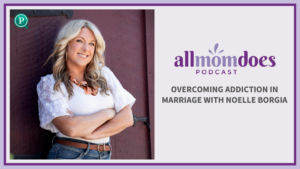We are continuing our celebration of season 5 with this insightful re-release with Julie Lyles Carr and looking at 6 ways we can all develop empathy. With Biblical insight and personal stories, Julie walks us through examples that we can each apply to our own lives today.
Listen to “Finding and Exercising Empathy with Julie Lyles Carr” on Spreaker.
Interview Links:
Find Julie: Website | Instagram | Facebook | Twitter
Check out Julie’s book: Raising An Original
Transcription:
Julie Lyles Carr: You’re listening to the AllMomDoes Podcast. I’m your host, Julie Lyles Carr. Many years ago, I had a really bizarre experience. Something I had not really walked through as a mom before. One of my children looked to be having some developmental delays and through a series of testing and events, I found myself having to put this child through a light sedation test that went on for about two hours.
And one of my dearest friends decided to be there with me. She decided to come and she sat with me as we sat silently during this test for two hours, because I was able to sit there with my child as the testing was going on and we couldn’t really talk. We just sat there and she would gaze at me, gaze at my child.
She would look at us both so lovingly. At the conclusion of the testing, the specialist who was involved gave me news that I did not want to hear. My child had a significant hearing loss, and this was going to usher us into a whole world of new things, new tests, new types of therapies. And that particular testing was about the third step in getting that child’s diagnosis, but it didn’t really make it any less challenging or difficult.
It was the confirmation actually of the things that we had been seeing in more rudimentary tests and my beautiful friend, Connie, who had been sitting with me there for two hours silently, while allowing me to just sit there with my child, when that news came in. She simply held me. She listened to me. She let me process.
She extended to me one of the most profound gifts we, as humans can give one another, and this was not because Connie had walked through this herself. It was not because she was faced with making the same decisions that my husband, Michael and I were going to be making for this child. It was, it was nothing of that sort but the gift she gave me was so profound. And that’s the gift we’re going to be talking about today.
I gotta be honest, being on social media right now is chest. I’m sure you feel it too. Holy moly. Am I right? I mean all the opinions and everything flying at us, how deeply entrenched people are in their perspectives on certain things, whether it is that we should be opening up or we shouldn’t be opening up, or we should all be heading back to work or we shouldn’t or where people stand on black lives matter and how people are posting things about the protests. And if you posted something or if you didn’t and what that means and on and on and on, it’s exhausting.
I mean in social media, it just feels like it is a lane that is strewn with shards of glass. And no matter where you step, something’s going to hurt, or you could end up hurting someone, it’s so difficult. And then there’s family discourse, there’s workplace discourse, the people who are closest to us as our relatives, the people that we are close to in terms of what we do as a career and all the divergence of opinions there, and the passionately held strongly defended opinions that are held within those spheres of influence in our lives.
It’s just, Ugh. Wow. And so I’m not naïve enough to say that what my friend, Connie extended to me would fix everything, but I am telling you it sure would help. And furthermore, it’s one of the best ways I believe to be Jesus in this world, this world right now that is swirling with such diverse and such passionate opinions.
And that gift that my friend Connie gave me. It’s empathy. Now I’ve gotta be honest. Empathy is one of those words that I’ve heard thrown around a lot. I’m sure you have too. And I’ve associated it with a lot of things. I just, you know, it’s just sort of there, it’s one of those things that you can extend people, but it reminds me of when I first started teaching my kids about using tools around the house, you know, my dad was really great at helping me have a pretty good understanding of how to use a lot of different tools and how to do certain, you know, elementary repairs on certain household appliances and electrical system and that kind of a thing. And it started with really understanding the difference with tools. And I was reminded again about how critical this is when I was working on a project and I was sending one of my kids to go find a screwdriver for me.
And they kept coming back with something that, you know, yeah, it was a screwdriver, but it was the wrong kind of screwdriver. I would be needing a Phillips head and they would bring me a Flathead or I would need a Flathead and they’d bring me a Phillips head. And we had to take a pause. We had to take a time out to talk about the difference between these two types of screwdrivers that kind of look like the same thing, but obviously are very different in terms of how they’re going to help equip you to do the job at hand. Brene Brown talks about that she sees compassion as this overall place that we need to be living, but within the toolbox of compassion, if you will, she talks about that.
We have empathy as one of the tools now. My problem is I’ve often confused empathy with another tool in that compassion toolbox, just like my kids have confused a Phillips head and a Flathead. I have confused sympathy often with empathy. And so I want to break it down for you in the way that it really resonated with me the difference between sympathy and empathy.
Because my friend, Connie, that I was telling you about what she really exhibited with me when she sat with me through that testing with my child. And when she was with me during that diagnosis meeting, what she exhibited for me was true empathy and it’s different than sympathy. So let’s start with sympathy. One of these tools in the compassion toolbox.
Sympathy is when we can relate to someone because we’ve been there. We have common feelings for them. There’s a game that I talk about that I often watch new mothers play and I absolutely confessional participated 100%. And you’ve probably seen this game played too.
It’s where one gal starts talking about her labor and delivery with her child. And then what happens…then the next gal starts talking about hers and depending on the group, you’re with you, either one up each other with your worst birth story, just how long the labor was, how extensive the episiotomy, all the things right? Or people one up each other in terms of how beautifully their birth plan went and how they just visualized it. And they ate all the right things and everything went the right way. And then, you know, the next gal talks about her unbelievably even better birth or whatever.
Or we have something happen where someone begins telling us about the passing of one of their parents, and maybe we went through it a year ago. And so we start unpacking for them what it was like when our parent passed away. That is a component of sympathy. It’s where we already share common feelings. We already share common experiences. And so we relate to one another in that way.
Or sympathy is also the place where we actually stay distanced from that other person. Now here’s the irony. Sharing common feelings with someone is also a way of distancing. And let me unpack that for you. If I don’t really understand what someone’s been through and I haven’t been there, I can just say, Oh, that’s too bad, or, Oh, I just can’t imagine. I just can’t imagine. And so we can feel bad for them, but we’re not engaging ourselves in their emotional journey simply because of them.
So we are either engaging with them based on the fact that we can absolutely quote unquote “sympathize”, because we’ve been there. We’ve had that really tough 24 hour labor, or we’ve had that experience of a boss being tyrannical. And therefore we understand where they’ve been, but we’re not really using it to connect deeply with their experience.
We’re coming alongside and saying we’ve had the same experience. Or we can exhibit sympathy for someone, but we’re not sharing the emotions that they are having. So yeah, we feel bad for them, but we don’t intrinsically get deeply delved into what they’re going through.
Empathy that other tool in the compassion tool box, it costs us a whole lot more. It asks us to put on the other person’s shoes. Even if they have a life experience we can’t relate to, even if they come from a place that we don’t agree with, even if they are expressing it in ways that aren’t the way we would express it. It’s that willingness to adjust our perspective and attempt to see it through their eyes.
See it parks our opinion at the door in the interest of the other person. And that is so hard in our culture. Right now. We just lead out with all of our opinions, without taking a pause, to say, what is it in this person’s experience that might lead them to feel this way? And if I can understand and come alongside someone from the perspective of saying where have you walked? Where have you been? What has led you to this emotion? I have a far better chance of extending empathy to them.
See sympathy can partially be about your story and believe me, for example, with my friend, Connie, she hadn’t had a child who had walked through what I was walking through with my child. And through the course of our journey with that child, I did meet other moms who had been right where I had been, whose child had been exactly through the same testing. And I can tell you that the sympathy of those parents for us to be able to get together and process together was awesome. It was really helpful. That tool had its place. But I can also tell you that for someone to have given me their strong opinion about the choices we made for our child, about things that we chose to do in the way that we chose to raise her, if they had not been where we had been and made the choices that we had made, I didn’t want to hear it, but for friends who hadn’t been through it, who came alongside and said, I want to know more about this and how did you arrive at that decision and how did you feel? And wow. I can really see how that would make you feel that way. That was huge. I would say it was just as important as those people who had had the same experience, who I also got to come alongside with in terms of sympathy. But the empathy of people to invest in our family’s journey and my child’s journey, even though they had not had the same experience was massive.
It made me feel so much more connected. It made me feel not alone. It did a lot to dissipate some of the anger and confusion about the things that we were facing. So empathy is not about your story. And I’ve gotta be honest, many times in my misunderstanding of the Phillips head versus the Flathead and my misunderstanding of the difference between sympathy and empathy, I’ve tried to roll out with stories that relate to what someone else is going through. Even if I haven’t exactly stood where they’ve stood. You know, Oh really? Well, you know, I actually had an aunt who one time went through, blah, blah, blah. Well, one of my good friends in high school, she went through the same thing that you’re talking about.
I have so often been guilty of that, but that’s not really empathy to really see the individual in front of you and to really invest in their story without trying to add to the narrative. That’s the powerful tool that empathy is in helping others feel seen and known and heard empathy is when you are seeking to understand, but you don’t even necessarily share the life experience of the other person, but you are willing to feel their emotions with them.
I found this really random quote, but I really love it. It’s from the Journal of American Medical Association from may of 1958, so a few years ago, but it says “One of the most difficult tasks put upon man is reflective commitment to another’s problem while maintaining his own identity.” You know, sometimes we often confuse empathy with getting weirdly overly invested to where this, the circle and the focus go back on us. Like we start feeling so bad for someone or start feeling their feelings so badly that all of a sudden we’re the one needing to be dug out of the hole. And that’s not empathy either because that’s a selfish cycle that does nothing to truly allow the other person’s experience and feelings to be in the center of our focus for awhile. So I wanna read you that quote again, “One of the most difficult tasks put upon man is reflective commitment to another’s problem while maintaining his own identity.” See, here’s the thing we can be called upon to have deep empathy for people with whom we do not agree people with whom we do not share the same opinion, but people who are just as equally valuable to God. And so if we are going to be the kind of Jesus in the world that values people so highly, and remember Jesus was the guy who went to the cross for us all, for all of our mess, for all of the things. If we are going to be followers of him, then we have to be the kind of people who can deeply appreciate and come alongside those with whom we may not share life experience, with whom we may not share politics, with whom we may not share the same opinions. You know, a really beautiful example of how Jesus showed empathy. We find in John 11 and verse 35, where it tells us that Jesus wept, this was upon arriving at the home of Martha and Mary, two of his good friends, four days after the funeral of their brother Lazarus.
Now here’s what’s interesting. If Jesus was showing sympathy in the moment. It might be that he would have talked about the time that he had another good friend who passed away, or he could have also done that thing in sympathy of going, I feel bad for you ladies, but I’m just about to raise your brother from the dead so I can understand that you’re upset, but you know, it’s kind of a little bit distanced from me. Instead, what Jesus did was he showed tremendous empathy.
You know, his story was going to be that he was going to resurrect Lazarus from the dead, but he took the time, he made the sacrifice, he made the investment with Martha and Mary to show them that he stood with them. He understood the depth of their emotion. He understood the heaviness and the heart brokenness of what they had been through.
And so he allowed himself to become invested in their story. That’s the kind of empathy Jesus was willing to extend to those he cared about. Paul exhorts us in Romans 12 and verse 15, “Rejoice with those who rejoice and weep with those who weep.” He’s not saying rejoice with those who are rejoicing about things that you like to rejoice about.
And he’s not saying weep with those who are weeping about things that you weep about. Nope. He’s not asking us to sympathize. He’s asking us to empathize, to come alongside those who have someone in their court now, to rejoice at the rejoicing of their emotions and a week at the weeping of their emotions, it’s to actually participate in the suffering of another person.
I think a lot of times I have used sympathy as a way to keep myself a little bit buffered from the heaviness that empathy can bring, because empathy is a sacrifice. Empathy is a place where it’s not all about me anymore. Empathy is a place where I let someone else, if you will, have the spotlight have center stage to talk about what they’re going through.
Now, I got to tell you, I have these twins of mine. And my twins adore each other. I mean, they are crazy about each other, but I will also tell you that they are competitive little beans. I mean, from the womb forward, for example, one of my twins outweighed the other twin by two pounds. As we like to say she was getting the majority of the milkshake when they were still in the womb.
And it’s so fascinating watching the two of them growing up because they have such a connection. They have such a sympathy for one another, right? I mean, they were womb mates. They have grown up in the same house. They share the same birthday. They have a lot of the same friends and same interests. They can be sympathetic with one another because they have been as sympatico for a long time.
But what’s interesting is watching the two of them navigate having empathy. For one another, a lot of times when we have some kind of conflict arise and they get upset about something, they each clamor for their own turn to talk about what their experience is and what happened in their perspective and what they think should be done to the other’s twin and, and on and on.
And one of the things that we’ve had to work on with each of them is how to be empathetic. Now I got to say, one of them really is a pretty empathic person. One of my twins truly has this ability to come alongside someone and cry with them or laugh with them purely for the joy of coming alongside another human being. Really does. But it’s still a skill that we’re having to talk about and remind them of, because of this natural love and competitiveness that they have with one another.
How to truly be empathic to one another, who to exhibit empathy to one another. You know, the thing that I see is that we have a very empathic God who shows us empathy, Psalm 56 and eight says you keep track of all my sorrows. You have collected all my tears in your bottle. You have recorded each one in your book.
God’s not trying to brush it away. He’s not trying to contrast it to the hurts of others. He’s not trying to say that it doesn’t matter. Our hurts the things we go through do matter. And if that’s the example that we have in our guide, then why would we not extend that to those around us, particularly those whom we are concerned don’t know the love of God A huge, important part of the love of God and the way we show it to the world is by the kind of empathy that we extend to one another.
So how do we do it? How do we show empathy in this season? That seems so fraught with so many opinions, so many challenges, such a diversity of the way people think things should go. Well, let’s just run through six different ideas on that.
First of all. How about we stop and ask how someone’s doing. I got to tell you, particularly my social media feed, where I see somebody popping off about something, and I do not agree with their opinion. And I do not want to get into a political debate. This is hard for me to do, and yet I think it’s important and I’m not saying it should always be in the format of social media. Please hear me on that. I’m talking about in relationship. There is a good time to call and check on somebody. How are you doing?
You seem really, really anxious for all of the lockdown to be over, to be in a new phase of, of social distancing. You seem, I don’t know. I just feel like you saw, it sounded a little anxious about that. How are you feeling? How are you doing? Stop and ask? Don’t just assume. Don’t just go fly and by and roll your eyes.
Take a moment and ask about the emotion underneath what can sound like the very stern diatribe that’s been laid out. Secondly, interrupt your own inner dialogue. Now my husband, Mike and I, we, it took us quite a while to begin to sort this out in our romantic relationship. When we started dating. Mike was second in the nation in debate and very skilled, his original 10 year plan included going to law school and he was fantastic at debating anybody under the table. And I was no shrinking violet. I mean, if somebody was going to throw out an argument to me than I was going to come roaring back with everything that I had. Over time, we had to figure out that the ability we each had to be highly argumentative and persuasive and to pretend like we were on some movie set and a courtroom with each other was probably one of the worst things we could do in terms of building relationship and intimacy of communication with one another.
It didn’t make either one of us feel great. I mean, even if one of us won the debate, it still meant the other one of us felt devalued, felt maybe a little shamed, felt maybe a bit embarrassed. See, we seem to be living in a debate culture right now that has lost the most essential part of what human communication is supposed to be about.
And human communication is supposed, at its best, to be about connection. And yet, because we have been so busy debating one another, just like Mike and I made the mistake of, when we are so busy debating one another our inner dialogue is on high volume. What we’re hearing all the time is all of the rebuttal that we can make all of the research that we have hidden in our index card file like Mike used to take to his debate rounds. We have to interrupt the inner dialogue intentionally.
A good friend of mine. Shanda Sumpter says that one of the most important things that she says to her son when he gets all swelled up about something that she’ll say, “I hear you, buddy. I hear you.” When she’s encountered something in a business situation where someone is upset or someone has a different opinion, she says she tries to be really intentional to pause and to say, “I hear you. I hear you.” You know, you can hear someone without agreement with them. Did you know that? You can hear their opinion about why they posted a particular thing or why they hold a particular view without agreeing with them, but you can make them feel heard.
And so often when we take that moment to extend empathy of saying, I hear you. In that way we can come alongside. Even if we stand on two different sides of the aisle, for someone to know they’ve been heard without a, but leave that out. You don’t have to say that. Just let them know that you hear them.
Thirdly, I want to encourage you to go do your own research and not the places you would normally go. I think this is so important. You know, my early career was in radio and television news. That’s what I did professionally. And when I started out in news, there was this very common misconception. I think now we’ve exposed it more for what it is.
But the bottom line is it’s pretty much impossible for human beings, even journalists, even those making documentaries to check their personal opinions and agenda at the door. Now, I think it’s great that we do live in an age, which has become frankly, a lot more transparent. We know which news agencies and generally which periodicals lean one way or the other when it comes to politics, when it comes to health news, all of those kinds of things.
The problem is we usually pick the lane of research, whether that is in journals or in newspapers or a new sites or on blogs or whatever. We prefer the ones that validate our opinions. Because again, back to point number two, we’re in debate mode, we are preparing to go into debate mode and make up all of our little index cards with all of the things that go along with what we want to believe about a situation.
It’s been fascinating to me those people in my world who believe locked down should be over, who have a whole wealth of links they will send you. And the people in my world who believe that lockdown should go on until 2021 and all of the links, they will send you. Very well researched papers if you will.
But here’s the problem. We have to have the maturity to go to places we wouldn’t normally go. One of my brothers says that in his business career, he says, you know, fish can’t see water. When you get so immersed in only looking at the things that align with what you already believe. Well, that’s just self fulfilling prophecy.
So be willing to go take a look at resources that you might not agree with them, but they can give you a different perspective. They can help you grow muscles on that empathy tool that you want to be using right now.
Four, don’t listen to someone with the intent to prove your point. You know, sometimes when we’re listening to someone or we’re reading an article that we don’t necessarily align with, we’re looking for all the places where we can come zinging in with that one liner that’ll shut it down or that one meme. That’s just going to show everybody out there. Listen, that is just yelling into an echo chamber. And that has no part in empathy. As much vitriol is we see being tossed around right now. Oh man. What if we listened within intent to come alongside. What if we listened with any intent to better educate ourselves on someone else’s perspective. You already know what you think and what your opinion is.
How about expand yourself enough to include a better grasp of where people who you don’t necessarily get their whole deal, but what if you were willing? To invest in them as humans and come alongside to at least educate and see where they’re coming from without looking for chinks in their fence, in which you can insert your own opinions and ideas.
Fifth. See, here’s the deal. I think we all need a great big Selah right now. Are you familiar with that phrase in Psalms in the book of Psalms where it’s this beautiful Hebrew word that essentially says, just pause, just stay here a minute. Let it soak in a little bit. We see something and we are so fast to post or retweet.
To go off on something we’re fed up. We’re tired. We don’t understand how can people say and here we go posting it everywhere. Well, let me give you a little clue when we are posting along those lines. A lot of times, all we’re doing is simply adding more fuel to those who already the think the way we do and then we’re alienating people who really could use our love and our concern right now. So it doesn’t cost you anything to put off retweeting that article or that meme that you think is going to prove your point again. It doesn’t cost you that much. If you can’t say anything nice as mama would say, how about you don’t post anything at all for awhile?
What if you became a safe place in social media where people knew they could be heard. What if you became a safe place where you just spread joy, what if you became a safe place where you spread encouragement? I mean, believe me, there are plenty of people out there already posting all kinds of political and medical stuff.
Do we really need more of that right now? No. Do we need people who are compassionate? People who can teach us about empathy? Oh yeah. Yeah, we do. So ponder don’t post.
And then finally this avoid the temptation of fixing. Ahh yeah. Let me raise my hand and raise it. Hi, I’m a fixer y’all when somebody is hurting.
One of my natural go-to’s is to try to fix it for them, whether I am coming to them in that compassion plays out of sympathy or empathy. One of my immediate things, often beyond the diatribes and the dialogue and the debate is I want to fix it. I don’t want him to feel bad anymore. I want to quell their fears or I want to advocate for them.
Now, believe me. I do think there is a time and the word of God talks about this, that, you know, we don’t just send people along their way, we do try to serve them deeply, but there is a time that serving is about just sitting in the sorrow of the other person for awhile. Really important. When I look at Job’s friends as well, intentioned as they tried to be, they all jumped in trying to fix things. They all jumped in from a sympathy perspective. They all jumped in from a debate perspective often. And yet how powerful, if we would be willing to lay down the idea of having to fix something in its immediacy. And just sit in the sorrow of the other person. Let’s say you have someone in your world right now who’s really struggling with the isolation they feel because of lockdown or they’re really struggling with their fears about jobs, or they’re very, very fearful with all of what is going on between protests and police force and the racial issues and the fear they feel is so deep and so real. What if, what if. You and I were willing to simply sit in the sorrow of the other person and just let them know we’re there. Now, will there come a time that we can do things that are proactive? Of course. And we should. Too often we get riled up about things for people, and then there’s no follow-up on the other side. But part of what people need for healing, part of what people need for feeling seen and heard is for you to just sit with them.
Like my friend Connie, did. She just sat with me in it and it was profound. Would you be willing to do that? I’m having to work on it and myself. Because that’s the investment that empathy is, to really be willing to sit there and feel with that person their emotions, not your emotions in response to their emotions, not the emotions you have surrounding the topic or the issue or the situation, to really sit there and feel it with them. That’s the kind of weeping that Jesus did. That’s the kind of rejoicing and weeping that Paul talks about in the book of Romans. Again, I don’t pretend it’s going to fix everything in this complex season of ours, but I’m telling you empathy is going to take us far further in being a light to this world, than any meme, any link to a news article, any well-developed argument you might have about whatever particular topic at hand. We serve a God of compassion. And one of the tools in his toolbox is empathy. And I am hoping to learn how to use it well.
Check out the show notes for all the links, info, and other goodness from this week’s episode, with a big thank you to our content coordinator, Rebecca. I’ve got a request, please go like, and leave a review wherever you get your podcasts. It really does make a difference in helping other people find the show. And I’ll see you next week here at the AllMomDoes podcast.
Follow this podcast:







